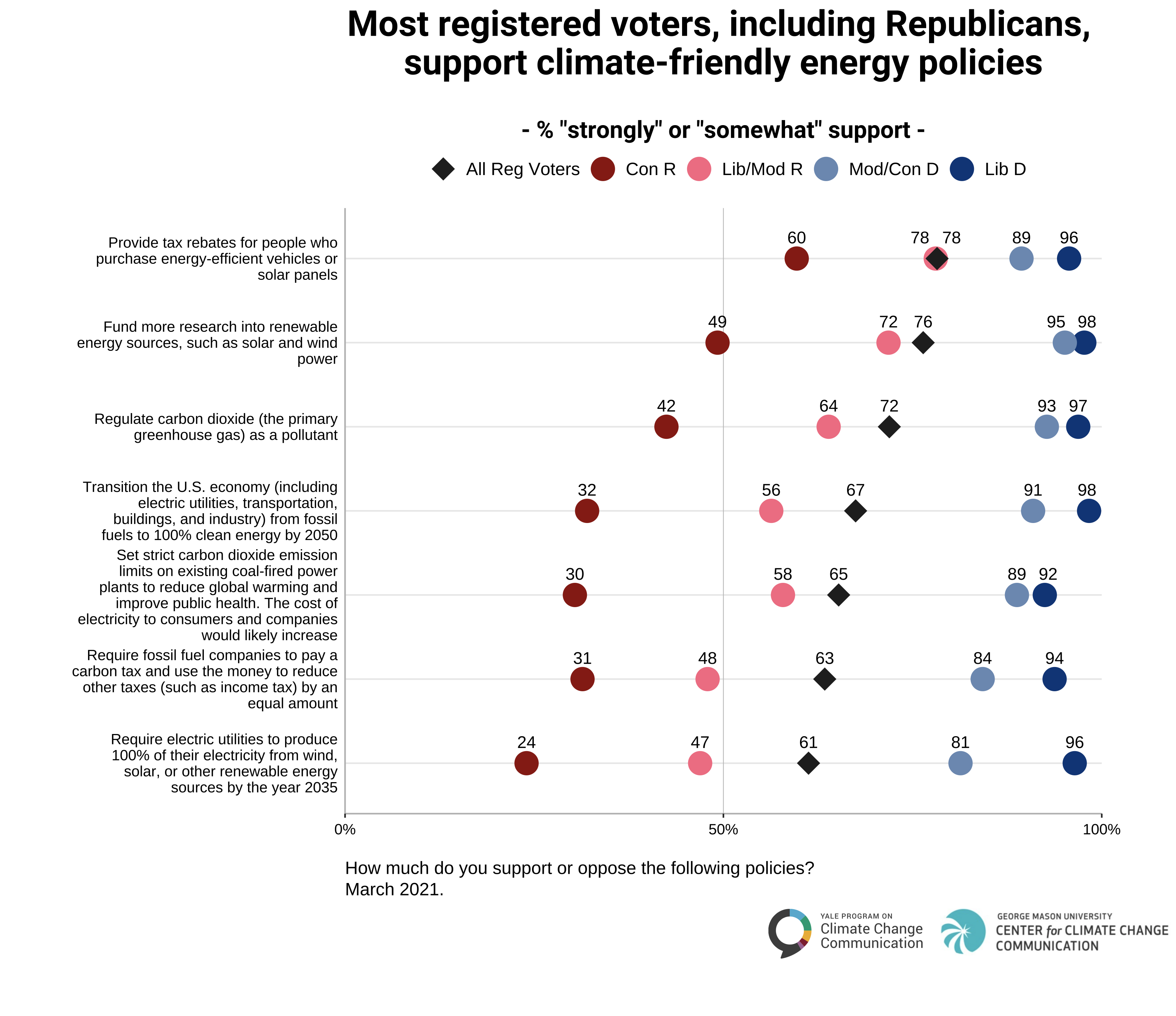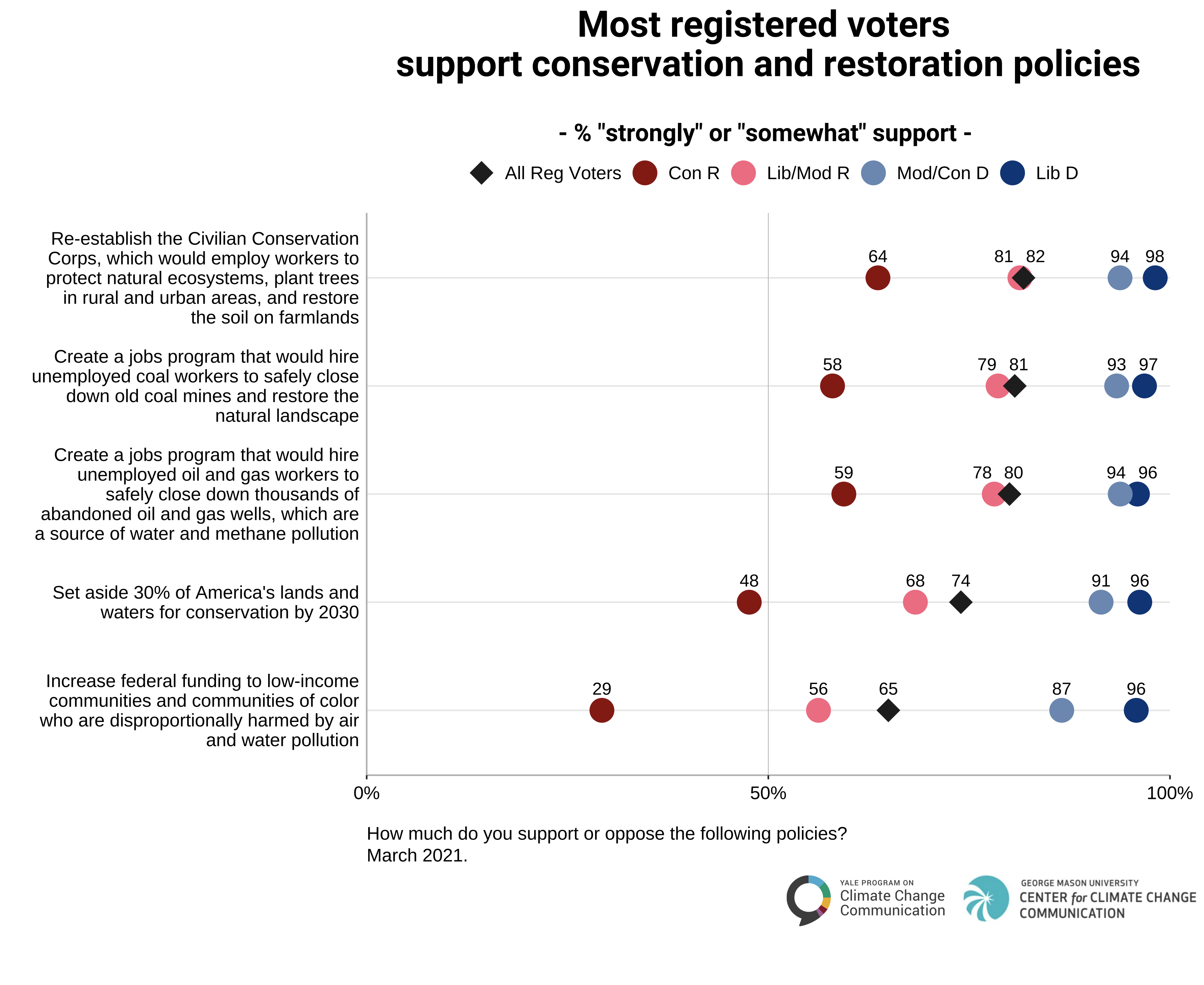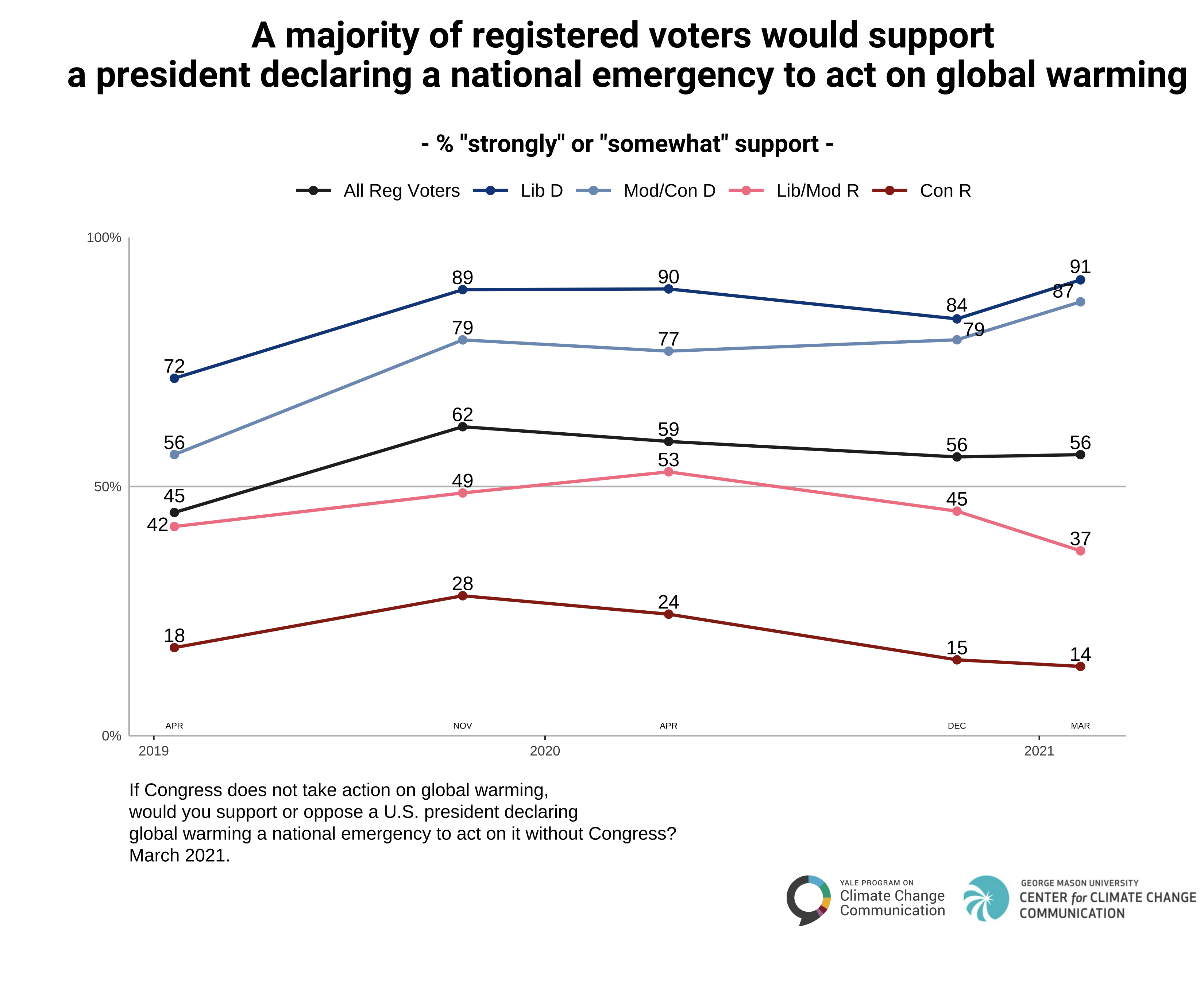Report · Jun 3, 2021
Politics & Global Warming, March 2021
By Anthony Leiserowitz, Edward Maibach, Seth Rosenthal, John Kotcher, Jennifer Carman, Xinran Wang, Matthew Goldberg, Karine Lacroix and Jennifer Marlon
Filed under: Policy & Politics
2. Support for Policies to Reduce the Pollution that Causes Global Warming
2.1. Most registered voters, including many Republicans, support climate-friendly energy policies.
Registered voters across the political spectrum support many energy policies designed to reduce carbon pollution and fossil fuel dependence and promote clean energy, including:
- Providing tax rebates to people who purchase energy-efficient vehicles or solar panels: 78% of registered voters, 96% of liberal Democrats, 89% of moderate/conservative Democrats, 78% of liberal/moderate Republicans, and 60% of conservative Republicans.
- Funding more research into renewable energy sources: 76% of registered voters, 98% of liberal Democrats, 95% of moderate/conservative Democrats, 72% of liberal/moderate Republicans, and 49% of conservative Republicans.
- Regulating carbon dioxide as a pollutant: 72% of registered voters, 97% of liberal Democrats, 93% of moderate/conservative Democrats, 64% of liberal/moderate Republicans, and 42% of conservative Republicans.
- Transitioning the U.S. economy (including electric utilities, transportation, buildings, and industry) from fossil fuels to 100% clean energy by 2050: 67% of registered voters, 98% of liberal Democrats, 91% of moderate/conservative Democrats, 56% of liberal/moderate Republicans, and 32% of conservative Republicans.
- Setting strict carbon dioxide emission limits on existing coal-fired power plants: 65% of registered voters, 92% of liberal Democrats, 89% of moderate/conservative Democrats, 58% of liberal/moderate Republicans, and 30% of conservative Republicans.
- Requiring fossil fuel companies to pay a tax on the carbon pollution they produce, and use that revenue to reduce other taxes (such as the federal income tax) by an equal amount (i.e., a revenue-neutral carbon tax): 63% of registered voters, 94% of liberal Democrats, 84% of moderate/conservative Democrats, 48% of liberal/moderate Republicans, and 31% of conservative Republicans.
- Requiring electric utilities to produce 100% of their electricity from renewable energy sources by the year 2035: 61% of registered voters, 96% of liberal Democrats, 81% of moderate/conservative Democrats, 47% of liberal/moderate Republicans, and 24% of conservative Republicans.
2.2. Most registered voters support conservation and restoration policies.
Registered voters across the political spectrum support a range of conservation and restoration policies, including:
- Re-establishing the Civilian Conservation Corps, which would employ workers to protect natural ecosystems, plant trees in rural and urban areas, and restore the soil on farmlands: 82% of registered voters, 98% of liberal Democrats, 94% of moderate/conservative Democrats, 81% of liberal/moderate Republicans, and 64% of conservative Republicans.
- Creating a jobs program that would hire unemployed coal workers to safely close down old coal mines and restore the natural landscape: 81% of registered voters, 97% of liberal Democrats, 93% of moderate/conservative Democrats, 79% of liberal/moderate Republicans, and 58% of conservative Republicans.
- Creating a jobs program that would hire unemployed oil and gas workers to safely close down thousands of abandoned oil and gas wells, which are a source of water and methane pollution: 80% of registered voters, 96% of liberal Democrats, 94% of moderate/conservative Democrats, 78% of liberal/moderate Republicans, and 59% of conservative Republicans.
- Setting aside 30% of American’s lands and waters for conservation by 2030: 74% of registered voters, 96% of liberal Democrats, 91% of moderate/conservative Democrats, 68% of liberal/moderate Republicans, and 48% of conservative Republicans.
- Increasing federal funding to low-income communities and communities of color who are disproportionally harmed by air and water pollution: 65% of registered voters, 96% of liberal Democrats, 87% of moderate/conservative Democrats, 56% of liberal/moderate Republicans, and 29% of conservative Republicans.
2.3. A majority of registered voters would support a president declaring a national emergency to act on global warming.
More than half of registered voters (56%) would “strongly” or “somewhat” would support a U.S. president declaring global warming a national emergency to act on it if Congress does not. This action has the support of large majorities of both liberal Democrats (91%, with 50% saying they “strongly support” it; see Data Tables) and moderate/conservative Democrats (87%). By contrast, only 37% of liberal/moderate Republicans and 14% of conservative Republicans would support it (and 86% of conservative Republicans oppose it, including 68% who “strongly oppose” it, see Data Tables).


